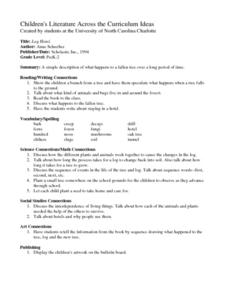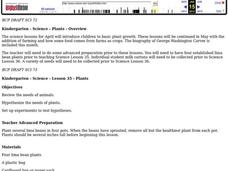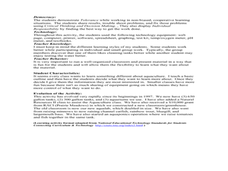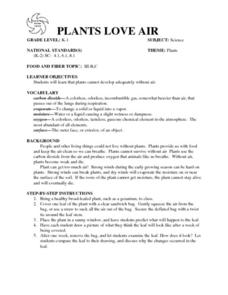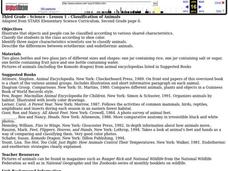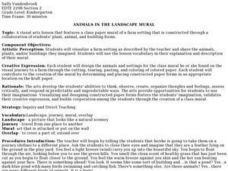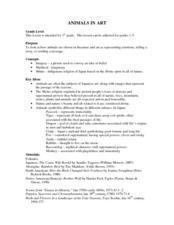Curated OER
Proteins from Plants to People
Students participate in a scientific activity to identify the building blocks for proteins (amino acids) that are needed to grow. They identify foods that contain proteins, how they are digested and rearrange the building blocks. They...
Curated OER
FOREST GRUMP: Examining How Deforestation Affects Plants and Animals of the Canadian Boreal
Young scholars consider definition of an ecosystem as it relates to the Canadian boreal, discover how deforestation affects this forest and recreate ecosystems. They write persuasive letters urging politicians or business people to help...
Curated OER
How Many Animals?
Learners use their math skills to develop estimates for the population of several animal species native to the Austrailian rainforest. It is a simulation that researchers at the Center for Rainforest Studies in Australia perform to...
Curated OER
Farming Number 6
In this environment worksheet, students identify and explain the importance of water and farming. They identify the differences between food items and whether they are a fruit, vegetable, or animal. Students also respond to 5 yes/no...
Curated OER
Defining Drought
Students examine the hydrologic impacts of drought. Humans can change the course of the water cycle, to some extent, to meet their needs, but can they do so without imposing risks on the plants and animals?
Curated OER
We All Live Together
First graders examine the lifestyle of classroom and family pets in their natural habitat. They determine the needs of plants and animals, and how those needs are met. They listen to read alouds, sing songs, and draw using computer based...
Curated OER
Log Hotel
Learners identify how the different plants and animals work together to cause the changes in the log. Students discuss the sequence of events in the life of the tree and log. Learners plant a seed to take home and care for. Students...
Curated OER
9th Grade
Ninth graders discuss the principal source of energy entering the marine ecosystem. They name some of the autotrophs at the Maui Ocean Center. Students name some of the heterotrophs at Maui Ocean Center. They are taught that plants are...
Curated OER
Bio-What
Learners explore the concept of biodiversity. Through activities, they discover the importance of one species upon another. Students examine food webs, discuss animals interdependence upon one another, and brainstorm why biodiversity is...
Curated OER
I Wonder What a Pest Is...
Students observe what animals are considered to be pests and why. They conduct a mock trial of a honeybee arguing if it is a pest or not. They determine pros and cons of honeybees to prepare for the trial.
Andrea Mulder-Slater
Happy Accidents Painting
A person can see a lot of different things when he looks at the amorphous clouds. The same is true when you let your watercolor paints do as they please. Little artists create haphazard art with watercolors, then use ink or marker to...
Curated OER
Plants
Students review the needs of animals, hypothesize the needs of plants, and set up experiments to test hypotheses.
Curated OER
Aquaculture Production in the Classroom
High schoolers study the basics of aquaculture and how to successfully raise aquatic plants and animals. In this water lesson students perform water quality tests on fish tanks, record and graph their results.
Curated OER
PLANTS LOVE AIR
Young scholars identify that plants cannot develop adequately without air and predict what happens to the leaf of a geranium brought to class. They draw a picture of what they think the leaf will look like after a week of being covered....
Curated OER
Animals Galore
Third graders use structural characteristics to sort and classify animals into groups.
Curated OER
Plants for Pleasure and Profit
Young scholars study about some of the specimens collected or diagrammed by Lewis and Clark, discuss their usefulness, and rank their importance. They write a persuasive essay detailing the plants they thought the most important.
Curated OER
Helping plants grow well
Students explore the effect of water, temperature and light on plant growth. Students are asked if they remember the LAW for plants. This is Light, Air(temperature) and Water, which all plants need for growth. Students are divided...
Curated OER
Classification of Animals
Third graders practice classiyfying items and identify three major characteristics scientists use to classify animals. They describe the differences between ectothermic and endothermic animals.
Curated OER
Animals, Piece by Piece
Students receive teacher prepared puzzles of animals. They try to name the animal by looking at only one piece. Students work in groups to assemble the puzzle pieces and name the animal. They draw their own pictures of the animals in...
Curated OER
What Animals Eat
First graders organize animals according to what they eat. They compare the teeth of plant eaters and meat eaters.
Curated OER
Flora and Fauna as Figures of Speech
Students view artwork in manuscript pages depicting insects, animals, plants, flowers, and ornate writing, such as those found in the Mira calligraphiae monumenta in the Getty Museum.
Curated OER
Mythical Animals
Students create imaginary animals by assembling pictures of body parts from pictures of real animals. This is one of three linked tasks. The others are "Who's Parts Do I Have?" and "Animals Piece by Piece."
Curated OER
Animals in the Landscape Mural
Students design animals and settings for the class mural they find on the visual journey to a farm through the cutting, tearing, pasting, and coloring of colored paper. Visualizing and designing constructed paper forms fosters Students'...
Curated OER
Animals in Art
Students look at how animals are shown in literature and art as representing emotions, telling a story, or sending a message in this elementary school Language Arts and Visual Arts lesson.
Other popular searches
- Plants and Animals
- Arctic Plants and Animals
- Aquatic Plants and Animals
- Coastal Plants and Animals
- Artic Plants and Animals
- Plants and Animals Needs
- Plants and Animals Interact
- Desert Plants and Animals
- Plants and Animals Die
- Attic Plants and Animals
- Comparing Plants and Animals
- Animals Plants and Water








